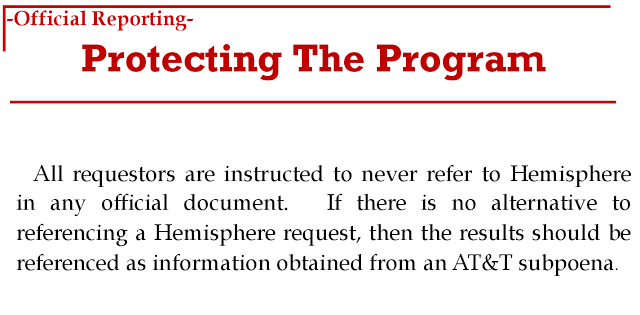Madison Ruppert
The U.S. Drug Enforcement Administration (DEA) has routinely accessed an AT&T database of Americans’ phone records spanning over 25 years, according to a newly-published 27-page PowerPoint presentation.
 |
| image credit: PowerPoint presentation obtained by Drew Hendricks, published by The New York Times |
This comes after it was revealed that the DEA has used NSA surveillance to investigate Americans and that the NSA has collected all U.S. phone records from Verizon.
The DEA practice, known as the “Hemisphere Project” reportedly involved a tight-knit relationship between the agency and the company.
The government reportedly paid AT&T employees to give DEA agents phone data ranging all the way back to 1987, according to the The New York Times, as part of a relationship that began in 2007.
The report states that the government actually pays AT&T to place their employees in drug units where they work with DEA agents and local detectives. A relationship of this nature goes far beyond the massive harvesting of phone records by the NSA.
Unlike the NSA’s collection of phone records, the Hemisphere Project data is stored by AT&T with access granted via “administrative subpoena.”
An administrative subpoena is not issued by a judge or grand jury – not even an entity like the Foreign Intelligence Surveillance Court, which rubber stamps almost all applications.
Instead, it is issued by a federal agency like the DEA, totally bypassing any and all oversight.
“Subpoenaing drug dealers’ phone records is a bread-and-butter tactic in the course of criminal investigations,” Justice Department spokesman Brian Fallon said in a statement to the Times.
While the Obama administration acknowledged the previously secret program, they claimed that there are no privacy risks presented by the program.
“The records are maintained at all times by the phone company, not the government,” Fallon said.
Still, there very well may be Fourth Amendment with the program, according to Daniel Richman, a Columbia law professor and former federal drug prosecutor in Manhattan.
The government’s involvement with, and interest in, the storage of such an immense amount of data may present constitutional issues, according to Richman, aside from any issues raised by the actual use of the database.
This program is paid for by the American people via the DEA and the White House drug policy office, according to Fallon. He said that the cost of the program “was not immediately available.”
 Hemisphere “simply streamlines the process of serving the subpoena to the phone company so law enforcement can quickly keep up with drug dealers when they switch phone numbers to try to avoid detection,” he said.
Hemisphere “simply streamlines the process of serving the subpoena to the phone company so law enforcement can quickly keep up with drug dealers when they switch phone numbers to try to avoid detection,” he said.
This program does not just include the records of AT&T customers. The database includes records of every single call that passes through the massive AT&T network.
The Hemisphere Project’s database continues to grow by a staggering 4 billion records per day.
The program was revealed to the Times by Drew Hendricks, a peace activist who received a 27-slide PowerPoint presentation on the program through public information requests filed with police agencies on the west coast.
The presentation is unclassified but marked as “law enforcement sensitive,” and has been “carried out in great secrecy,” according to the Times.
Indeed, one slide says, “All requestors are instructed to never refer to Hemisphere in any official document.”
Furthermore, a Times search of the Nexis database discovered that the Hemisphere Project was not mentioned in any Congressional hearings or news reports since it began in 2007.
When CNET contacted AT&T about the report, the company said that they could not comment, though they did indicate that they are bound by the government’s requests for data.
“While we cannot comment on any particular matter, we, like all other companies, must respond to valid subpoenas issued by law enforcement,” an unnamed AT&T spokesperson said to CNET in a statement.
Jameel Jaffer, deputy legal director of the American Civil Liberties Union, told the Times that the PowerPoint presentation “certainly raises profound privacy concerns.”
“I’d speculate that one reason for the secrecy of the program is that it would be very hard to justify it to the public or the courts,” Jaffer said.
I’d love to hear your opinion, take a look at your story tips and even your original writing if you would like to get it published. I am also available for interviews on radio, television or any other format. Please email me at Admin@EndtheLie.com
Please support our work and help us start to pay contributors by doing your shopping through our Amazon link or check out some must-have products at our store.
This article first appeared at End the Lie.
Madison Ruppert is the Editor and Owner-Operator of the alternative news and analysis database End The Lie and has no affiliation with any NGO, political party, economic school, or other organization/cause. He is available for podcast and radio interviews. Madison also now has his own radio show on UCYTV Monday nights 7 PM – 9 PM PT/10 PM – 12 AM ET. Show page link here: http://UCY.TV/EndtheLie. If you have questions, comments, or corrections feel free to contact him at admin@EndtheLie.com


Be the first to comment on "DEA Database on Americans’ Phone Records Spans 25 Years: Report"